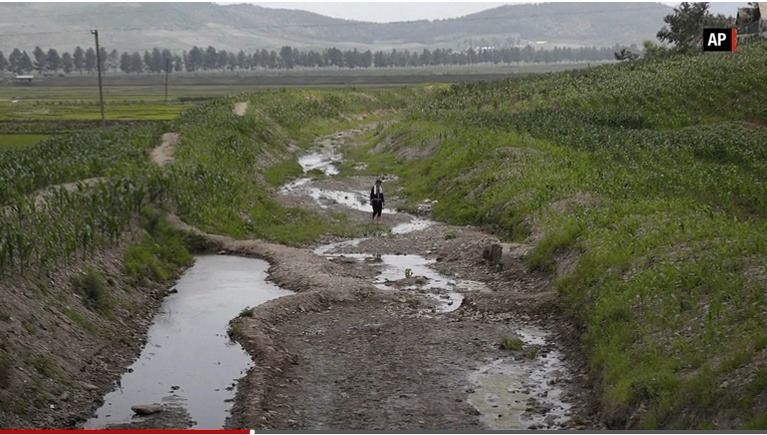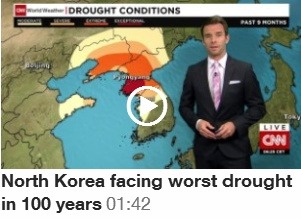https://thenewspro.org/?p=13253
CNN,
유례없는 가뭄으로 북한에 기근 초래할 전망
-국제 사회 북한 가뭄 지원 및 협력 의사
전해
-대규모
구제 노력 없으면 아사 상태 올 수도
CNN이
북한의 유례 없는 가뭄에 주목하고 있다. CNN은 26일 유엔 인권 고등 판무관의 말은 인용하여 지금 북한 주민들은 1990년대 기근에 이어
또다시 “북한에 곧 다가올 인류 참사”에 직면하고 있다고 보도했다.
유엔
판무관 제이드 라드 알 후세인은 “매우 심각한 기근이 되리라는 점에서 국제사회에 북한에 대한 지원과 도움을 요청한다”고 CNN에
말했다.
기사는
북한 주민 삶의 좋은 점만 보도하는 관영언론조차 최악의 가뭄이라 보도했으며, 중국도 북한을 도울 의사가 있고, 지금은 남북한이 협력해야 할
시기라는 한국 홍영표 통일부 장관의 발언을 전했다.
CNN은
또한 “앞으로 몇 주 몇 달 안에 대규모 구제노력이 없으면 대규모 아사 상태를 볼 수도 있다”는 유엔의 알 후세인의 경고를 보도했다. 한편,
기사는 지난 기근 이후 북한 정부가 획기적으로 수확량의 30%를 농가에 배분하는 방식을 도입해 수확을 현저히 증가시켰음을 언급하며, 이번
가뭄으로 말미암아 이 제도가 폐지될 수도 있으리라는 전문가의 우려의 목소리도 함께 전했다.
다음은
뉴스프로가 번역한 CNN 기사 전문이다.
번역 감수 : 임옥
기사
바로가기 ☞ http://cnn.it/1e9aCrx
North Korea’s historic drought expected to cause
famine, U. N. says
북한의 유례 없는 가뭄이 기근을 초래할 전망
By
Kathy Novak, CNN
Updated
0437 GMT (1137 HKT) June 26, 2015


Seoul,
South Korea (CNN) Even a simple piece of fruit was unfamiliar to Lee So-yeon
when she fled North Korea seven years ago. She had never seen an orange. So when
she came across one at a South Korean market, she bit into it like an apple —
peel and all.
한국
서울(CNN) 이소연씨가 7년 전 북한에서 탈출해 나왔을 당시 그녀에겐 흔한 과일 한 조각도 생소한 것이었다. 그녀는 오렌지를 구경한 적도
없었다. 그래서 한국의 마켓에서 오렌지를 보았을 때 그녀는 사과를 먹듯이 오렌지를 껍질째로 베어 물었다.
During
the famine of the 1990s, Lee was forced to eat grass from the mountains to
survive.
“We
were told that any grass that rabbits eat is edible,” she says. “So we picked
any grass we could find that wasn’t poisonous and mixed it with rice, or used it
to make grass porridge.
“Children
were suffering from malnutrition. Their stomachs were very swollen. … Their
whole faces were covered with fine hair and their hair was a very light brown
color instead of black. Their arms and legs were so skinny they looked like tree
branches.”
1990년대의
기근 동안 이 씨는 살아남기 위해 산에 있는 풀을 먹어야 했다. “토끼가 먹는 풀이면 먹어도 괜찮다고 들었다”고 그녀는 말한다. “그래서 우리는
독이 없는 것이라면 어떤 풀이든 뽑아서 밥과 섞거나 풀죽을 쑤었다. 아이들은 영양실조에 걸렸다. 아이들의 배가 심하게 부었다. … 아이들의 얼굴
전체가 가는 솜털로 뒤덮였고 머리카락은 검은색이 아니라 갈색이 됐다. 팔과 다리는 너무 말라서 나뭇가지처럼 보였다.”
Now,
North Koreans are again facing a “looming humanitarian disaster in the DPRK,” or
the Democratic People’s Republic of Korea, according to the United Nations human
rights chief.
유엔
인권 고등 판무관에 따르면 지금 북한 주민들은 또다시 “북한에 곧 다가올 인류 참사”를 직면하고 있다고 한다.
Zeid
Ra’ad Al Hussein told CNN, “We call for the international community to support
the DPRK and help the DPRK in a respect of what is going to be a very difficult
famine.”
제이드
라드 알 후세인은 “매우 심각한 기근이 되리라는 점에서 국제사회에 북한에 대한 지원과 도움을 요청한다”고 CNN에 말했다.
State
media, which usually paint only a rosy picture of life for North Korea’s
citizens, have been publishing reports about what they call the worst drought in
100 years.
주로
북한 주민들의 삶을 아름답게만 그리는 관영언론조차 100년 만에 찾아온 최악의 가뭄이라 부르며 이에 대해 보도해왔다.
“Their
decision to officially report the drought in their internal media is
remarkable,” says Andrei Lankov, a professor at South Korea’s Kookmin
University. “It’s a signal to both domestic and foreign audience that probably
something will go bad later this year. So they will probably apply for foreign
aid.”
“가뭄을
내부언론에서 공식적으로 보도하기로 한 결정은 주목할 만한 일이다”고 한국 국민대학교의 안드레이 란코프 교수는 말한다. “이는 아마 올해 후반기에
상황이 나빠질 것을 국내외에 알리는 신호다. 아마도 북한은 외국의 원조를 청할 것이다.”
Parched
rice paddies ‘incredibly serious’
바짝
마른 논 ‘놀라울 정도로 심각해’
China
says it is willing to help.
중국은
북한을 도울 의사가 있다고 말한다.
And
there’s been a neighborly offer of assistance from South Korea, even though the
two countries are technically at war. Seoul’s Unification Minister Hong Yong-pyo
says both Koreas are facing drought, and this could be a time for
cooperation.
한국과
북한은 엄밀하게 말해서 전쟁 중이지만 한국은 이웃 나라로서 도움을 제공해왔다. 한국 홍영표 통일부 장관은 남북한 모두 가뭄에 직면하고 있으며
지금이야말로 협력할 시기라고 말한다.
The
Asia deputy regional director for the U.N. World Food Programme, John Aylieff,
witnessed power cuts to the hydroelectric power supply when he was last in
Pyongyang, the North Korean capital. He says his staff members have reported low
reservoir and river levels.
유엔
세계 식량 프로그램의 아시아 부지부장인 존 아일리에프씨는 북한의 수도 평양을 최근 방문했을 때 수력발전을 통한 전력공급이 감량된 것을 목격했다.
그는 직원들이 저수지와 강의 수위가 낮다고 보고했다고 말한다.
“The
government has said … that the rice which is being transplanted in the fields as
we speak, about 40% of that is now in paddy fields which are parched. That
sounds incredibly serious.”
“정부는…지금
이 시각, 논에 이식되고 있는 벼의 약 40%가 현재 바싹 마른 논에 있다고 말했다. 그것은 정말로 심각한 것으로 들린다.”
The
U.N.’s Al Hussein warns, “You may well see starvation on a massive scale unless
there’s a massive relief effort in the weeks and months to come.”
유엔의
알 후세인은 “앞으로 몇 주 몇 달 안에 대규모 구제노력이 없으면 대규모 아사 상태를 볼 수도 있다”고 경고하고 있다.
Aylieff
is not predicting a famine like the one that killed upward of half a million
people in the 1990s.
아일리에프는1990년대
50만 명 이상을 사망하게 한 것과 같은 기근을 예측하는 것은 아니다.

북한
100년 만에 최악의 가뭄에 직면
But
he says if it does not rain soon, the main rice harvest will suffer. That could
cause food shortages by the end of the year — a major concern in a country where
a third of the children are already malnourished.
그러나
그는 곧 비가 오지 않으면 쌀 수확은 어려움을 겪을 것이라고 말한다. 그것은 연말까지는 식량 부족을 일으킬 수 있으며 이는 아이들의 3분의 1이
이미 영양실조 상태인 북한에 있어 큰 우려를 낳는다.
Malnutrition
fears
영양실조의
두려움
“It
doesn’t take very much for malnutrition to spike,” he says. “It doesn’t take
long for malnutrition to spike either. So a short and fairly serious shock to
the food system of the country can create quite serious implications for the
population.”
그는
“영양실조가 극에 달하기가 어려운 일이 아니다”고 말한다. “또 영양실조가 극에 달하는 데 오랜 시간이 걸리지도 않는다. 북한의 식량 체계에
단기간의, 상당히 심각한 충격을 가하면 북한 인구에 매우 심각한 영향이 초래될 수 있다.”
Lankov
points out that North Korea also had a drought last year, but still had a good
harvest. He is more worried about the implications for fledgling reforms to the
agricultural system.
란코프는
북한이 작년에도 가뭄을 겼었지만 추수는 풍작이었다고 지적한다. 그는 농업체계에 대한 어설픈 개혁의 결과들을 더 걱정하고 있다.
“Over
the last two years,” he explains, “the North Korean government has been
implementing a new and remarkably efficient policy which is based on the
household responsibilities. So farmers’ households are given 30% of the harvest
instead of the fixed rations they used to receive in the past. And as a result,
they work much better, and over the last two years North Korea had really good
harvests. Essentially they produced enough food to feed themselves.”
그는
“지난 2년 넘게 북한 정부는 가정책임제에 기반을 둔 놀랄 만큼 효과적인 새 정책을 시행해 오고 있다. 그래서 농부 가계는 과거에 받았던
고정비율 대신에 추수한 것의 30%를 받는다. 그리고 결과적으로 농부들은 일을 훨씬 잘하고 지난 2년 넘게 북한은 정말로 풍작이었다. 기본적으로
농부들은 스스로 먹을 충분한 식량을 생산했다”고 설명하고 있다.
Lankov
worries if the drought is as bad as some are predicting, the government will
once again force farmers to hand over all of their food, in the name of the
greater good.
란코프는
만일 가뭄이 몇몇이 예상하듯이 아주 심하다면 정부는 다시 한 번 더 큰 대의라는 명목하에 농부들에게 모든 식량을 국가에 넘기라고 강요할까 봐
걱정한다.
[번역
저작권자: 뉴스프로, 번역기사 전문 혹은 일부를 인용하실 때에는 반드시 출처를 밝혀주십시오.]
*****************************************************************************







